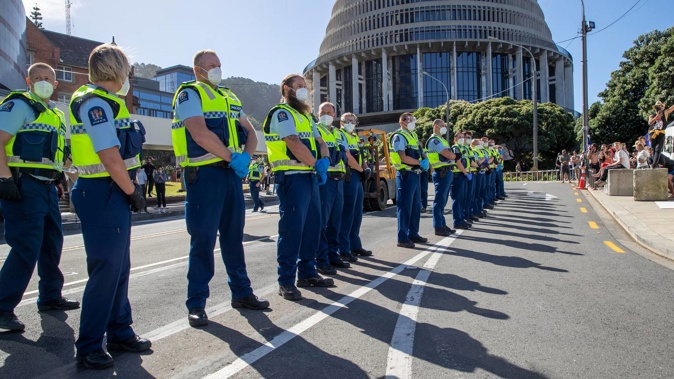

Negotiations between police and February 2021 parliamentary protesters were muddled, should have been initiated earlier, and ultimately made the police look “incompetent”.
Deputy Commissioner Wally Haumaha was in the firing line of the Independent Police Conduct Authority, which found he went above the specialist police negotiating team and hosted meetings with protesters without informing the specialist negotiators.
According to today’s report into the protest, there was no organised engagement between authorities and protesters during the first five days of the occupation.
The main contact between police and protesters largely occurred on the ground and amounted to frontline officers telling protesters to pack up and move on. The delay put police “at a disadvantage”, the report said.
By February 13, as the protest had bedded in, the Advanced Police Negotiation Team (APNT) started work on engaging with the various protest groups.
The APNT is trained in sieges and distressed offenders, but also demonstrations. The four-person team included a primary and secondary negotiator, a team leader and a log keeper.
Their goal was to find a sole point of contact they could build a rapport with.
APNT first identified former New Conservative leader Leighton Baker as a protest spokesman. The local controller of the police response met with him alone. APNT didn’t attend but was asked to manage all further contact after the initial face-to-face meeting.
Baker today told the Herald he appreciated the dialogue with police, but told them he was more interested in a dialogue with the Government: “Our issue wasn’t with the police.”
- 'Lucky someone didn’t get killed' - report into Parliament protest released
- 'Absolutely terrifying': IPCA report on violent Parliament protest released
Two days later, Police Deputy Commissioner, iwi and communities Wally Haumaha rang around his contacts to figure out who was involved in the protest leadership. He spoke to a senior pastor of the local Destiny Church, who “had influence” among occupiers.
The deputy commissioner is not named in the report, but at the time the role was held by Haumaha.
/cloudfront-ap-southeast-2.images.arcpublishing.com/nzme/EV7O4SYI6CTALIZQTMAVQNNJDE.png)
Deputy commissioner iwi and communities Wally Haumaha attempted to engage with protest leaders. Photo / File
The pastor he spoke with was connected to the Freedom and Rights Coalition, one of the larger groups at the protest.
But Haumaha’s contact with the pastor resulted in Baker refusing to engage further with the APNT negotiation team. As it turned out, both Baker and the specialist negotiation team had no idea Haumaha had approached the Destiny pastor.
On February 16, Haumaha met with the pastor in person - again APNT had no idea the meeting was planned, only finding out when a member of the team rang the pastor directly later that day.
The pastor was confused. He asked APNT who he was actually dealing with.
On the same day, Act leader David Seymour also met with protesters.
Meanwhile, police deputy commissioner, strategy and service Jevon McSkimming got in touch with a Melbourne-based lawyer, who was acting for Voices for Freedom (VFF) - another of the larger protest groups.
Again, this deputy commissioner was not named, but the role was held by Inspector Jevon McSkimming at the time.
The big meetings
On February 20, a face-to-face meeting occurred with Haumaha, McSkimming, Baker, the Melbourne-based lawyer, the pastor and the APNT co-ordinator.
“The effectiveness of this engagement is difficult to gauge,” the IPCA concluded in its report.
There was a discussion about traffic management, and the protest leaders supported the decision to install bollards the next day. But despite the dialogue, APNT had become concerned these leaders had little control over protesters.
That was proven by the large backlash to the bollards. While leaders agreed with the move at the meeting, protesters largely didn’t.
On February 22, Human Rights Commissioner Paul Hunt became involved after protesters approached him. He hosted a meeting with several protest leaders. Although the report doesn’t identify who, it included a senior police officer. Once again, APNT had no idea this meeting was happening.
The report says Hunt attempted to broker a meeting between protesters and government officials, which never eventuated.
The next day, then-Wellington Mayor Andy Foster hosted a meeting with protesters. Haumaha was there, but yet again, APNT had no idea the meeting was taking place.
The report said one of the main aims of the protesters was a meeting with Cabinet ministers. Police Commissioner Andrew Coster asked Prime Minister Jacinda Ardern directly if she’d meet with them on February 16.
She reportedly told Coster her inclination was always to meet people, but given the behaviour of the protesters, she was unwilling. She worried about the precedent it would set.
The report concluded that Haumaha was right to ring around contacts - but shouldn’t have gone ahead with meetings without the knowledge of APNT.
/cloudfront-ap-southeast-2.images.arcpublishing.com/nzme/IWZA3L2WUJCIFCRFCJUNI44AVU.jpg)
Police attempted to negotiate with protesters in the hope scenes didn't become ugly. Photo / Mike Scott
“Detailed notes of those meetings were not kept or passed on to the APNT who were sidelined on many occasions. Police were made to look incompetent when the APNT did not know what somebody else within Police was doing or agreeing to.”
With McSkimming, the authority said he had no pre-existing relationships and it was not part of his normal role to undertake engagement or operational tasks.
The report concluded both deputy commissioners should have been more transparent with other police staff. The lack of notes was problematic.
“With the fractured nature of the protest and multiple spokespeople, the importance of Police presenting a united front cannot be overstated.”
But the overarching issue was the lack of any negotiation strategy. There was no plan of who to contact and when, nor the purpose of the engagement other than the goal of ending the protest altogether - an outcome that was unlikely.
“All of Police should have supported APNT in undertaking that role, but they did not.”

Take your Radio, Podcasts and Music with you









